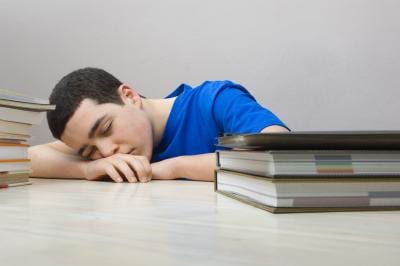Teenagers live busy lives. Between school, after-school jobs and time with friends, it may seem that most teenagers have no time for sleep. People need more sleep during the teenage years than they do as younger children or adults. According to MayoClinic.com, teenagers need at least nine hours of sleep a night, but most only get about six. The lack of sleep could be due to a busy lifestyle or it could point to a sleep disorder.
Delayed Sleep Phase Syndrome
Although most of the world demands that people go to sleep around 9 or 10 p.m. and wake up early in the morning, many teenagers experience a change in their internal clocks as they go through puberty. Usually, the body produces melatonin to signal that it is time to fall asleep. In teenagers, melatonin gets produced later at night, according to Kids Health. Teenagers may not become sleepy until much later in the evening, sometimes into the early morning hours, making it difficult for them to get the nine hours they need each night. Teenagers with delayed sleep phase syndrome may struggle to get up on time, lie awake for hours each night and feel drowsy during the day.
Nightmares
Teenagers who are under a lot of stress or who are anxious may suffer from nightmares that disrupt their sleep. If a teenager uses drugs or alcohol or takes certain medications, she may be more likely to suffer nightmares, according to Kids Health. Teenage girls are more likely to have nightmares than boys, states MayoClinic.com.
Obstructive Sleep Apnea
Teenagers who snore may also suffer from obstructive sleep apnea. When a teenager has sleep apnea, the airway becomes blocked during sleep and he may stop breathing. It typically occurs in overweight people or in people who have large tonsils. When a teenager’s airway becomes blocked, his body wakes up briefly to release the blockage. As apnea occurs throughout the night, a teenager may wake up hundreds of times, leaving him tired the next day.
Insomnia
Sometimes teenagers simply cannot fall asleep or they cannot stay asleep. Teenagers can experience insomnia due to stress or an uncomfortable bedroom. In some cases, the insomnia can be chronic, meaning it lasts for longer than one month. A teenager can make changes to his nighttime habits, such as not eating or exercising close to bedtime or not watching television or using the computer in bed, to help improve his insomnia.
Restless Leg Syndrome
A teenager who feels that he needs to move his legs when lying in bed may suffer from Restless Leg Syndrome. Some teenagers with RLS may feel tingling and cramping in their legs. The sensations and urge to move the legs are beyond the teenager’s control, which can make falling and staying asleep difficult. Teenagers with RLS are often tired during the day, which can interfere with performance in school





